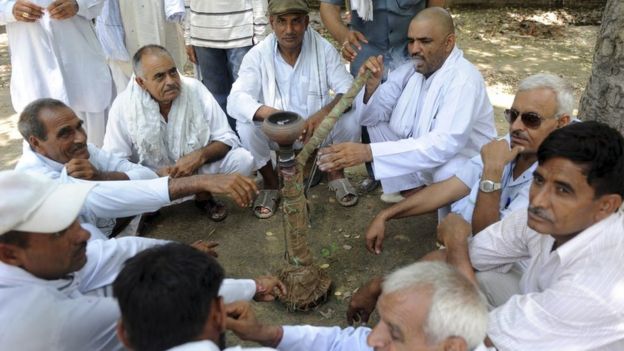Secret EU plan to deport 80,000 Afghans
More than 80,000 Afghans will need to be deported from Europe “in the near future” under a secret EU plan, amid warnings of a new influx as parts of the country fall back under Taliban control.
The European Commission should threaten to reduce aid that provides 40 per cent of Afghanistan's GDP unless the "difficult" Kabul government agrees to the mass removal of tens of thousands of failed asylum migrants, a leaked document suggests. It admits the threat, if carried through, could result in the collapse of the fragile state.
The Afghan elite will be rewarded with university places in Europe, under a new EU strategy to use aid and trade as “incentives” to secure deportation agreements for economic migrants from "safe" areas of Afghanistan.
The plan is revealed in a joint “non-paper” discussion document, marked EU Restricted, which was prepared by the European Commission and its foreign policy arm, the External Action Service, and sent to national ambassadors on March 3.
Record violence amid a Taliban insurgency, with 11,000 civilian casualties last year, and economic failure means there is a “high risk of further migratory flows to Europe,” it warns. There are 1.1 million internally displaced Afghans and 5.4 million sheltering in Pakistan and Iran, whose situation is "precarious without reliable long-term perspectives."
A migrant man from Afghanistan carrying a baby cries during a demonstration at the Greece-Macedonia border near the village of Idomeni, northern Greece
A man from Afghanistan carrying a baby cries during a demonstration at the Greece-Macedonia border near the village of Idomeni, northern Greece Photo: AFP
In October, the European Union is hosting an international donor summit for Afghanistan, with the intention of raising enough aid for the period 2017-20 to keep flows at their current levels.
Jean-Claude Juncker’s officials propose using the summit as “leverage” to secure a deportation deal, noting that the EU has pledged more to Afghanistan than any other country with €1.4 billion earmarked until 2020.
“The EU should stress that to reach the objective of the Brussels Conference to raise financial commitments ‘at or near current levels’ it is critical that substantial progress has been made in the negotiations with the Afghan Government on migration by early summer, giving the member states and other donors the confidence that Afghanistan is a reliable partner able to deliver,” it says.
Under a section entitled “Afghan interests,” it says President Ghani’s government is “highly aid dependent”. “Without the continued high levels of international transfers… [it] is unlikely to prevail, as it is being faced by multiple security, economic and political challenges”.
An Afghan migrant girl holds the hand of a woman as they arrive on a beach on the Greek island of Kos
An Afghan migrant girl holds the hand of a woman as they arrive on a beach on the Greek island of Kos Photo: AFP/Angelos Tzortzinis
Some 176,000 Afghans claimed asylum in the EU last year, with around six in ten eligible, a rate that has risen as the security situation deteriorates. They make up a quarter of refugees landing in Greece.
The paper, which was obtained by the Statewatch civil liberties website, says the EU’s co-operation with Afghanistan so far has been “difficult and uneven". Despite President Ghani’s public statements, “other members of the Government do not appear to facilitate the return of irregular migrants, while attempting to re-negotiate conditions to restrict the acceptance of returnees.”
In exchange for accepting “forced returns” of economic migrants from designated “safe areas” of the country, European universities could offer places to Afghan students and researchers under the Erasmus+ scholarship scheme, the paper says, under a section entitled: "Possible components of EU incentives package".
The document cautions, however, that “the risk that those students apply for asylum once in the EU and make their outmost not to return is however very high, as demonstrated by several cases recently.”
The CAPD development deal, which commits the EU to help in rural development, health, education and counter-drugs programs for a decade, could also be used as a bargaining chip to get a deportation agreement, the document says.
The EU will also provide training and healthcare to those who are deported.
Afghan President Ashraf Ghani (R) shakes hands with British Prime Minister David Cameron during a press conference at the Presidential palace in Kabul
Afghan President Ashraf Ghani (R) shakes hands with British Prime Minister David Cameron during a press conference at the Presidential palace in Kabul. The Ghani government is being "difficult", the report says. Photo: AFP/Getty Images
It admits that identifying the safe areas of Afghanistan when processing asylum claims is “not obvious, given the rising insecurity in many provinces”.
The plan also suggests using the laissez passer, a legally controversial deporting document issued by the EU to migrants who have lost or destroyed their own papers.
The EU has publicly embraced a strategy of chequebook diplomacy as it struggles to contain the biggest migrant crisis since 1945.
The proposed deal appears similar to a gambit rejected by African leaders in Malta last year, in which the EU offered €1.8 billion in aid , university places and looser conditions for holders of diplomatic passports in exchange for accepting the forcible deportation of hundreds of thousands of African economic migrants. In the end, leaders settled on a voluntary scheme of returns.
It follows a controversial deal on Friday with Turkey, which was awarded €6 billion and visa liberalisation in exchange for the near-automatic return of all asylum seekers reaching the Greek islands.
Earlier this month Theresa May won a Court of Appeal case to resume deportations to Afghanistan under a separate arrangement. Judges ruled that while several provinces are dangerous, Kabul is safe enough for returns.
Germany, a major destination for Afghan migrants, is pushing hard for its own deportation agreement.
